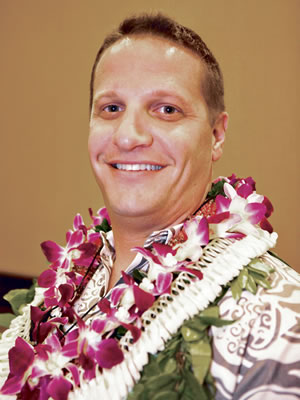Safety Doesn’t Happen By Accident
Safety is one of the pillars of a successful visitor industry. Destinations that have high crime rates, or experience just a handful of highly publicized incidents, quickly find that travelers easily go elsewhere to enjoy themselves or conduct business.
That’s why safety is one of the Hawaii visitor industry’s top priorities. On the frontlines of public and visitor safety are, of course, our local first-responders: police officers, firefighters, emergency medical technicians, life guards, and emergency management staff, complemented by representatives of federal law enforcement agencies.
But equally important to our safety are the security personnel at Hawaii’s hotels and resorts, who work closely with their government counterparts to ensure that visitors and residents alike can enjoy peace of mind.
The visitor industry’s security force is personified by Kaleo Keolanui, Safety and Security Manager for Aulani, a Disney Resort and Spa, at Ko Olina. Kaleo is the former president of the Hawaii Hotel and Visitor Industry Security Association (HHVISA), having served in that capacity for seven years until this past January, when he stepped down to concentrate on the opening of Aulani.
Kaleo, who was the Director of Safety and Security for the Hyatt Regency Waikiki Beach Resort and Spa before joining Aulani, says that hotel security is much more than just the protection of guests from potential crime. Security officers serve as fire marshals; crisis and emergency managers, as with last March’s tsunami alert; and workplace health and safety inspectors as they identify and report problems with the buildings and grounds. And as representatives of their hotels and resorts, everyday guest relations are also a major part of their diverse duties.
With such responsibilities, HHVISA plays an essential role in helping security personnel throughout the islands by keeping them abreast of pertinent issues and priorities in their profession.
HHVISA members represent hotels and resorts across the state, private security companies hired by the smaller hotels, county police and fire departments, the state and county emergency management agencies, federal law enforcement agencies like the Federal Bureau of Investigation, Drug Enforcement Administration, U.S. Marshals, and Secret Service, and local businesses who supply security equipment and services.
“HHVISA is a forum for key communication for the overall visitor industry,” says Kaleo.
The association meets once a month, where members share information and exchange statistical data about criminal activity or learn about the latest developments in their field. The last portion of the meeting is open to general questions and concerns from members.
“As an industry group, if we can identify trends, like room break-ins or thefts, for example, we’re better prepared to prevent and respond to these problems,” he explains.
The strong working relationships and collaboration that HHVISA has with county police departments enable its members to “get the word out” and help address problems promptly and effectively.
In addition to crime-related topics, the monthly meetings give members an opportunity to interact and learn from their governmental partners, such as the fire department regarding fire prevention, or to get updated on the latest health risks like viruses and public health threats from the Department of Health. Their partnerships with state and county emergency management agencies meant that hotel security officers received timely information on last year’s tsunami so they could make decisions and know when to implement their internal procedures, which included warnings to guests and, in many cases, evacuation of guests and staff to shelters.

Preparation and being proactive are key. Kaleo points out that the visitor industry had “good plans in place,” which allowed the entire industry to respond well to the March tsunami alert last year. The emergency management agencies kept the hotels informed and the hotels’ preparations meant everything went smoothly.
It’s comforting and reassuring to know that the safety and security of not only our visitors, but our most important industry, are in the hands of these outstanding professionals. These are the unsung heroes of our industry who devote themselves each day to the well-being of others.
MUFI’S VISITOR HEROES
Matt Neely
Position: Security Officer
Location: Sheraton Waikiki
Sheraton Waikiki security officer Matt Neely was homeless just a little more than four years ago. Personal problems had led to the loss of his job and home, and he crashed on a friend’s couch for six months and lived in a park for the next six. So when a friend offered to help, Matt accepted that offer and turned his life around.
He soon got a job as a banquet associate at the Sheraton Waikiki. The high marks he earned from his manager led to a promotion to the security department, and he embraced his job with passion and compassion. He has a positive, humble attitude described as “infectious.”
Says Matt, “I’ve realized that when you give yourself to helping someone else, you accomplish something wonderful.” For example, when a guest lost her wallet and all her cash and credit cards, he left money for her to have dinner. The guest was so touched by his gesture that she booked another stay at the Sheraton. He comforted another guest who was disoriented after a fall, and searched high and low for a woman who had lost her child (the child was enjoying the surf), typical of his big personality and even bigger heart.
Matt Neely volunteers at the Waikiki Health Center, where he helps recovering addicts. He also volunteers with the Life Foundation, which assists people with HIV and AIDS. He delivers groceries and meals to those unable to leave their homes and ferries them to doctors’ appointments. These are some of the reasons Matt was an honoree for security officer of the year at the Hawaii Lodging & Tourism Association’s 2012 Na Poe Paahana awards ceremony.





